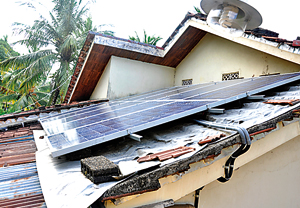Power to Appuhamy
Power cuts affecting everyday life? Not for Durand Appuhamy who having switched to solar power, says the Ceylon Electricity Board (CEB) and their power cuts can go jump in the Kelani River. Mr. Appuhamy had a solar power system installed at his residence in Negombo, enabling him to move away from the main grid. The system has only been active for about a week so far, but when the lights go off in the morning, Mr. Appuhamy can still cook his breakfast in the microwave, have the fan on and watch television.

Life goes on as usual for Mr. Appuhamy amidst the power cuts
“Power cuts don’t affect me at all now,” he says. “Last night the power was out, there were no lights in the area except for my garden light working entirely on solar power.”Mr. Appuhamy says he regularly uses several electronics that consume a lot of power. He has two microwaves (in case one breaks down), two air conditioners, two refrigerators and several fans to name a few.
He cannot live without his fans, he says, as he perspires a lot. So when the power cuts began this month, he was fed up.
“There were several reasons why I wanted to move away from the main grid,” he says. “First, I’m very worried about the situation in West Asia. I recently read Israel is considering war with Iran. Can you imagine what that will do to our petroleum supply?
Then what happens to our electricity when it doesn’t rain as 80 percent of it is hydroelectric? They already have water wars, farmers fighting other farmers for water. These things went through my mind, so more for personal comfort I decided to be independent of the grid.”
He first got the idea for a solar-powered house when he visited the Greek island Crete in 1992. He was amazed to see all the hotels using solar panels and hilltop wind turbines to generate electricity. Unfortunately, the technology was not available in Sri Lanka at the time.
“I also inquired about the wind turbines,” he said. “Turns out I can erect one in my backyard, but it will create a lot of noise and will disturb the neighbours.”
His idea seemed plausible once he saw a green energy advertisement in the newspaper. Soon, he had BAM Green workers setting up a photovoltaic (PV) system in his house. He has 10 solar panels, 24 solar batteries and two inverters to generate approximately 250 to 300 units of electricity each month. The solar panels on the roof generate an electric current upon exposure to light, the inverters convert the direct current to be usable by the residential grid, and the batteries store the generated electricity.
Mr. Appuhamy said installing the PV system didn’t require rewiring the house. All the cables are drawn from outside and connected to the existing electrical wiring. The system is completely independent of the main electrical grid, but the inverters have a bypass switch just in case Mr. Appuhamy needs to switch to the main grid.
“If it rains for three days or there is no sunshine for days –which is highly unlikely in our country– and the solar batteries dry up, these inverters will automatically switch back to the grid,” he said.
Right now, he has most of his electronics connected to the PV system, except for his cooker, which he rarely uses but will soon be connected once a bigger inverter is acquired. He receives an electricity bill around Rs. 10, 000 each month, which he hopes will be down to Rs. 1000 or Rs. 2000 from next month on.
The whole operation cost him about Rs. 1.6 million, including the cost of equipment plus labour. Mr. Appuhamy says he doesn’t expect to recover the cost but the money spent was “completely worth it” knowing that he’s “secure in case the grid collapses.”
“I know it’s a bit expensive and not accessible to most people,” he said. “It can cost the money to build a small house. I could afford it because I live on a Sterling Pound income not a Rupee one. However, I encourage people who can afford it to move to solar power.”

The solar panels on the roof. Pix by Susantha Liyanawatte
The main reason solar power equipment is expensive is taxes, says BAM Green Project Manager Asanka Thennakoon. Solar modules are subjected to Value Added Tax, Nation Building Tax, and ports and airport levies. “There are some heavy taxes for the equipment, specifically for batteries,” Mr. Thennakoon said. “The government charges 28 percent for batteries. They charge 66 percent for aluminium mounting systems, which is very unreasonable. So we use galvanized ones. For customers, in the end there will be taxes for about 30 percent.”
He added that the government should look to relax these taxes, especially given the current energy crisis and rising prices for fossil fuel.
“There was a cold war happening for oil, now the cold war has shifted to energy research because countries are now focusing on developing solar energy,” Mr. Thennakoon said. “People should recognise the importance of renewable energy.”
The government is only interested in subsidizing small diesel power plant producers without showing any interest in sustainable energy, Mr. Thennakoon claimed.
“The reason for the energy crisis is that 85 percent of the Ceylon Engineering Board taxpayer money goes for these small power producers. There’s great potential for solar energy in this country but still for very political reasons it’s diesel suppliers that are being subsidized instead of focusing on solar energy,” he said.
Mr. Appuhamy also agrees that there should be more focus on sustainable energy solutions, like in rural India, where 100,000 households are now provided electricity through solar power, or rural Africa, where solar panels generate electricity to mud huts.
comments powered by Disqus
























